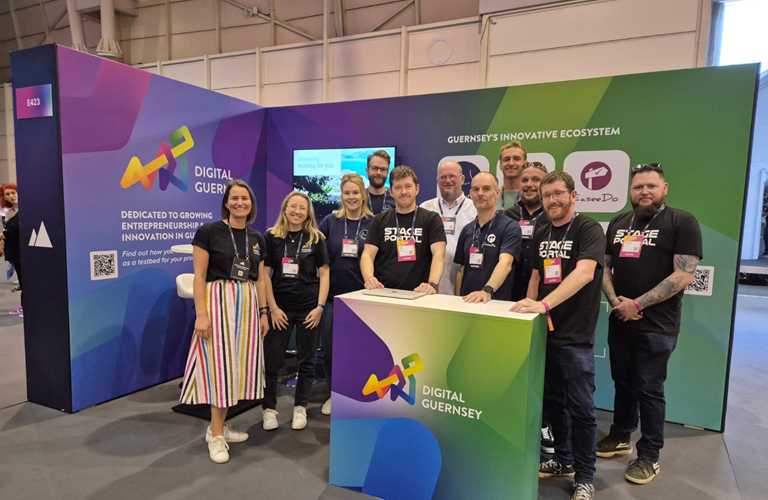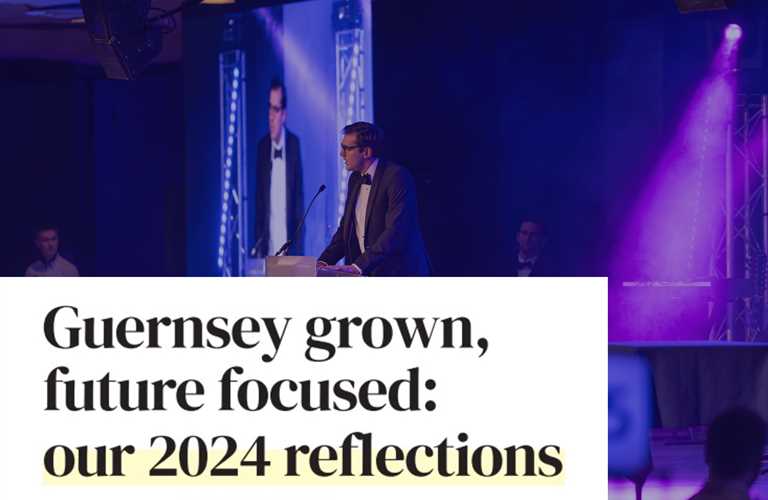Exploring a safe and sustainable Crypto Future in Guernsey
During Data Driven Guernsey Week, we were joined by Katie Hudson, Philip Le Pelley and Ben Byrom in a panel session that discussed the future of crypto for Guernsey. You can watch the full livestream of the event at the bottom of this article.
If you didn't know, cryptocurrency is a form of digital money. Big names might come to mind like Bitcoin and Ethereum. What sets crypto apart is the technology behind them, and the currency issues they look to solve like slow expensive bank transfers, outdated credit cards and financial inequality. With cryptocurrency you may be able to get rid of banks and other centralised middlemen altogether, allowing everyone to easily access their funds. That's because cryptocurrencies rely on a technology called blockchain, a decentralised platform that functions as a highly secure digital ledger of information which makes the virtual data difficult to track, hack or duplicate.
A quick history of cryptocurrency
The first ever cryptocurrency was Bitcoin, and it was the first product of the first blockchain developed by an anonymous entity who went by the name of Satoshi Nakamoto. Satoshi released the idea of Bitcoin in 2008 and described it as a “purely peer-to-peer version” of electronic money. Bitcoin was the first established cryptocurrency, but many attempts at creating digital currencies occurred years before Bitcoin was formally introduced, and more than 1,500 cryptocurrencies have been created since, with many dying out or having wacky names such as Dogecoin, KodakCoin, KryptoKitties and more.
Cryptocurrencies like Bitcoin are created through a process called mining. Very different to mining ore, mining cryptocurrencies involves powerful computers solving complicated problems and require vast amounts of energy consumption to function. According to the Cambridge Bitcoin Electricity Consumption Index the amount of electricity consumed by bitcoin mining a year could boil enough water for all cups of tea consumed in the UK for 30 years. The Bitcoin Energy Consumption Index by cryptocurrency platform Digiconomist puts the usage on a par with Denmark, consuming 33 terawatts of electricity annually. Bitcoin’s biggest problem is perhaps not even its massive energy consumption, but the fact most mining facilties in Bitcoin’s network are powered by fossil fuels.
How can cryptocurrency be more sustainable?
The non-renewable energy sources that are used to power the computers are worrying environmentalists, since they are using sources such as coal. NFTs (non-fungible tokens) have risen in popularity over the last few years in the crypto space, these virtual tokens that use blockchain technology to claim proof of ownership of valuables such as digital artwork and virtual property. These tokens run mainly on the Ethereum blockchain system, and their generation consumes a large amount of power. According to research on Github, selling just one piece of artwork on Ethereum has a carbon footprint starting at around 100 KgCO2, equivalent to a one-hour flight. Amid cries for change, there are more sustainable systems in the works. The Ethereum Foundation estimate's that a new version of Ethereum will use 99.95% less energy when it's complete. But for the time being there are green cryptocurrencies that enthusiasts can invest in instead such as Chia, Cardano, Solarcoin and Bitgreen.
Chia's 'farming' process is designed to be less energy intensive by employing hard drives - a concept known as proof of space - rather than mining proof-of-work used by Bitcoin which relies on computer processors. This means that Chia coins can be farmed on the hard drives of laptops or desktops by home users because it doesn't rely on such huge amounts of electricity. Cardano coin uses a proof-of-stake system called Ouroboros that requires users to purchase tokens to join the network, thus saving vast amounts of energy. Developed by Charles Hoskinson – co-founder of Ethereum, it can achieve 1,000 transactions a second compared to up to seven with bitcoin.
Other sustainable cryptocurrencies such as Solarcoin and Bitgreen promote sustainability. Solarcoin promotes the creation of solar energy by rewarding generators with solar coins for every megawatt hour created by solar technology. The eco-friendly bitgreen crypto was launched as a green alternative to bitcoin, seeking to encourage positive environmental behaviour by rewarding users for actions such as, drinking sustainable coffee, car-sharing and volunteering.
“Don’t dismiss the technology - people want that clarity from the regulators, otherwise you risk being left behind."
Ben Byrom, a Director at Ravenscroft Investment Management
So, what is the future of crypto for Guernsey?
During our virtual panel event in Data Driven Guernsey 2022, Ben Byrom, a Director at Ravenscroft Investment Management suggested that we must leverage our strengths in this area, by using our pre-existing expertise in the financial services to use crypto to the best of our ability. There are many industries that will be disrupted by this technology, so as an island we must embrace the crypto space in order to not get left behind. If the island does not take action then it stands at risk of falling short with competitors and relevancy in the evolving digital marketplace looming on the horizon. So what are the blockers for Guernsey currently? Guernsey currently sits behind many other jurisdictions due to regulations. However, Philip Le Pelley, counters that that Guernsey's exchange-traded fund for bitcoin - introduced by the Guernsey Financial Services Commission - is is a good start that plays into Guernsey’s strengths.
Lawmakers across the world must find ways to establish laws to make cryptocurrency safer for investors and Guernsey is no different. Perhaps in the future there will be a Guernsey-only cryptocurrency, but it will take some innovation in the sector before that happens. The demand for greater regulatory clarity for the cryptocurrency space to ensure that people are not using it for improper purposes such as money laundering - walks a fine line between too little regulation that results in a lack of trust in the industry and too much regulation that stifles any chance of innovation.
Ben Byrom suggested that using the block chain could reduce the risks, costs, inefficiencies and errors for counter-parties, and in theory everything could be decentralised. From mortgages to the property market, crypto currencies could become a part of wealth management portfolios among traditional bonds and funds, taking the local finance sector into the next age of digital.


